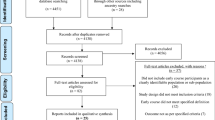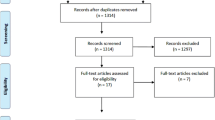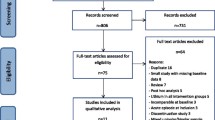Abstract
The aim of this review was to consider the literature concerned with a sequential use of pharmacotherapy and psychotherapy in mood disorders. Review of the clinical trials where treatment components were used in a sequential order were identified by using MEDLINE, a manual search of the literature and the Index Medicus. In unipolar recurrent depression, the sequential use of pharmacotherapy and psychotherapy was found to improve relapse rate. In bipolar disorder, the use of psychotherapeutic strategies in patients who were already assuming mood stabilizers was also found to yield clinical benefits. The sequential model has the potential for improving the logic and timing of interventions. A conceptual shift in current assessment methods (staging) is needed.
Similar content being viewed by others
References
Benazzi, F. (2007). Is there a continuity between bipolar and depressive disorders? Psychotherapy and Psychosomatics, 76(2), 70–76.
Bero, L. Oostvogel, F. Bacchetti, P., & Lee, K. (2007). Factors associated with findings of published trials of drug–drug comparisons: Why some statins appear more efficacious than others. PLoS Medicine, 4(6), e184, www.plosmedicine.org.
Blom, M. B. J., Jonker, K., Dusseldorp, E., Spinhoven, P., Hoencamp, E., Haffmans, J., et al. (2007). Combination treatment for acute depression is superior only when psychotherapy is added to medication. Psychotherapy and Psychosomatics, 76, 289–297.
Bockting, C. L. H., Schene, A. H., Spinhoven, P., Koeter, M. W. J., Wounters, L. F., Huyser, J., et al. (2005). Preventing relapse/recurrence in recurrent depression using cognitive therapy. Journal of Consulting and Clinical Psychology, 73, 647–657.
Bockting, C. L. H., Spinhoven, P., Koeter, M. V. T., Wounters, L. F., & Schene, A. H. (2006). Differential predictors of response to preventive cognitive therapy in recurrent depression. Psychotherapy and Psychosomatics, 75, 229–236.
Castle, D., Berk, M., Berk L., Lauder S., Chamberlain J., & Gilbert M. (2007). Pilot of group intervention for bipolar disorder. International Journal of Psychiatry in Clinical Practice, 11, 279–284.
Colom, F., Vieta, E., Martinez-Aran, A., Reinares, M., Gaikolea, J. M., Benabarre, A., et al. (2003a). A randomized trial on the efficacy of group psychoeducation in the prophylaxis of recurrences in bipolar patients whose disease is on remission. Archives of General Psychiatry, 60, 402–407.
Colom, F., Vieta, E., Reinares, M., Martinez-Aran, A., Torrent, C., Gaikolea, J. M., et al. (2003b). Psychoeducation efficacy in bipolar disorder: beyond compliance enhancement. Journal of Clinical Psychiatry, 64, 1101–1105.
Cuffel, B. J., Azocar, F., Tomlin, M., Greenfield, S. F., Bush, A. B., & Croghan, T. W. (2003). Remission, residual symptoms, and non response in the usual treatment of major depression in managed clinical practice. Journal of Clinical Psychiatry, 64, 397–402.
Davies, J. M., Janicak, P. G., & Hogan, D. M. (1999). Mood stabilizers in the prevention of recurrent affective disorders. Acta Psychiatrica Scandinavica, 100, 406–417.
De Fruyt, J., & Demyttenaere, K. (2007). Bipolar (spectrum) disorder and mood stabilization: Standing at the crossroads? Psychotherapy and Psychosomatics, 76(2), 77–88.
Emmelkamp, P. M. G. (2004). The additional value of clinimetrics needs to be established rather than assumed. Psychotherapy and Psychosomatics, 73, 142–144.
Fabbri, S., Fava, G. A., Rafanelli, C., & Tomba, E. (2007). Family intervention approach to loss of clinical effect during long-term antidepressant treatment: A pilot study. Journal of Clinical Psychiatry, 68(9), 1348–1351.
Fava, G. A. (1996). The concept of recovery in affective disorders. Psychotherapy and Psychosomatics, 65, 2–13.
Fava, G. A. (1999). Subclinical symptoms in mood disorders. Psychological Medicine, 29, 47–61.
Fava, G. A. (2003). Can long-term treatment with antidepressant drugs worsen the course of depression? Journal of Clinical Psychiatry, 64, 123–133.
Fava, G. A., Bartolucci, G., Rafanelli, C., & Mangelli, L. (2001). Cognitive behavioral management of patients with bipolar disorder relapsing while on lithium prophylaxis. Journal of Clinical Psychiatry, 62, 556–559.
Fava, G. A., Fabbri, S., & Sonino, N. (2002a). Residual symptoms in depression: An emerging therapeutic target. Progress in Neuropsychopharmacology and Biological Psychiatry, 26, 1019–1027.
Fava, G. A., Grandi, S., Zielezny, M., Canestrari, R., & Morphy, M. A. (1994). Cognitive behavioral treatment of residual symptoms in primary major depressive disorders. American Journal of Psychiatry, 151, 1295–1299.
Fava, G. A., Grandi, S., Zielezny, M., Rafanelli, C., & Canestrari, R. (1996). Four year outcome for cognitive behavioral treatment of residual symptoms in major depression. American Journal of Psychiatry, 153, 945–947.
Fava, G. A., & Kellner, R. (1991). Prodromal symptoms in affective disorder. American Journal of Psychiatry, 148, 823–830.
Fava, G. A., & Kellner, R. (1993). Staging: A neglected dimension in psychiatric classification. Acta Psychiatrica Scandinavica, 87, 225–230.
Fava, G. A., Rafanelli, C., Grandi, S., Canestrari, R., & Morphy, M. A. (1998a). Six year outcome for cognitive behavioral treatment of residual symptoms in major depression. American Journal of Psychiatry, 155, 1443–1445.
Fava, G. A., Rafanelli, C., Grandi, S., Conti, S., & Belluardo, P. (1998b). Prevention of recurrent depression with cognitive behavioral therapy. Archives of General Psychiatry, 55, 816–820.
Fava, G. A., Rafanelli, C., Grandi, S., Conti, S., & Belluardo, P. (1999). The role of residual subthreshold symptoms in early episode relapse in unipolar major depressive disorder (Letter to Editor—Reply). Archives of General Psychiatry, 56, 765.
Fava, G. A., & Ruini, C. (2003). Development and characteristics of a well-being enhancing psychotherapeutic strategy: Well-being therapy. Journal of Behavior Therapy and Experimental Psychiatry, 34, 45–63.
Fava, G. A., Ruini, C., & Belaise, C. (2007a). The concept of recovery in major depression. Psychological Medicine, 37, 307–317.
Fava, G. A., Ruini, C., & Rafanelli, C. (2004a). Psychometric theory is an obstacle to the progress of clinical research. Psychotherapy and Psychosomatics, 73, 145–148.
Fava, G. A., Ruini, C., & Rafanelli, C. (2005). Sequential treatment of mood and anxiety disorders. Journal of Clinical Psychiatry, 66, 1392–1400.
Fava, G. A., Ruini, C., Rafanelli, C., Finos, L., Conti, S., & Grandi, S. (2004b). Six-year outcome of cognitive behavior therapy for prevention of recurrent depression. American Journal of Psychiatry, 161, 1872–1876.
Fava, G. A., Ruini, C., Rafanelli, C., & Grandi, S. (2002b). Cognitive behavior approach to loss of clinical effect during long-term antidepressant treatment. American Journal of Psychiatry, 159, 2094–2095.
Fava, G. A., Ruini, C., & Sonino, N. (2003). Treatment of recurrent depression a sequential psychotherapeutic and psychopharmacological approach. CNS Drugs, 17(15), 1109–1115.
Fava, M., & Rush, A. J. (2006). Current status of augmentation and combination treatments for major depressive disorder: A literature review and a proposal for a novel approach to improve practice. Psychotherapy and Psychosomatics, 75, 139–153.
Fava, G. A., Tomba, E., & Grandi, S. (2007b). The road to recovery from depression. Don’t drive today with yesterday’s map. Psychotherapy and Psychosomatics, 76, 260–265.
Fava, G. A., & Tossani, E. (2007). Prodromal stage of major depression. Early Intervention in Psychiatry, 1, 9–18.
Frank, E., Grochocinski, V. J., Spanier, C. A., Buysse, D. J., Cherry, C. R., Honck, P. R., et al. (2000). Interpersonal psychotherapy and antidepressant medication: Evaluation of a sequential treatment strategy in women with recurrent major depression. Journal of Clinical Psychiatry, 61, 51–57.
Gaynes, B. N., Magruder, K. M., Burns, B. J., Wagner, H. R., Yarnall, K. S. H., & Broadhead, W. E. (1999). Does a coexisting anxiety disorder predict persistence of depressive illness in primary care patients with major depression? General Hospital Psychiatry, 21, 158–167.
Ghaemi, S. N., & Baldessarini, R. J. (2007). The manic-depressive spectrum and mood stabilization: Kraepelin’s ghost. Psychotherapy and Psychosomatics, 76(2), 65–69.
Goldapple, K., Segal, Z., Garson, C., Lau, M., Bieling, P., Kennedy, S., et al. (2004). Modulation of cortical-limbic pathways in major depression. Archives of General Psychiatry, 61, 34–41.
Grandi, S. (2003). The sequential parallel comparison model. Psychotherapy and Psychosomatics, 72, 113–114.
Hollon, S. D., de Rubeis, R. J., Shelton, R. C., Amsterdam, J. D., Salomon, R. M., O’Reardon, J. P., et al. (2005a). Prevention of relapse following cognitive therapy vs medications in moderate to severe depression. Archives of General Psychiatry, 62, 417–422.
Hollon, S. D., Jarrett, R. B., Nierenberg, A. A., Thase, M. E., Trivedi, M., & Rush, A. J. (2005b). Psychotherapy and medication in the treatment of adult and geriatric depression: which monotherapy or combined treatment? Journal of Clinical Psychiatry, 66, 455–468.
Kirsch, I., Deacon, B. J., Huedo-Medina, T. B., Scoboria, A., Moore, T. J., & Johnson, B. T. (2008). Initial severity and antidepressant benefits: A meta-analysis of data submitted to the food and drug administration. PLoS Medicine, 5(2), e45, www.plosmedicine.org.
Kupfer, D. J. (1992). Maintenance treatment in recurrent depression. British Journal of Psychiatry, 161, 309–316.
Lam, D. H., Watkins, E. R., Hayward, P., Bright, J., Wright, K., Kerr, N., et al. (2003). A randomized controlled study of cognitive therapy for relapse prevention for bipolar affective disorder. Archives of General Psychiatry, 60, 145–152.
Ma, S. H., & Teasdale, J. D. (2004). Mindfulness-based cognitive therapy for depression. Journal of Consulting and Clinical Psychology, 72, 31–40.
Maj, M. (2005). The aftermath of the concept of psychiatric comorbidity. Psychotherapy and Psychosomatics, 74, 65–67.
McGorry, P. D., Hichie, I. B., Yang, A. R., Pantelis, C., & Jackson, H. J. (2006). Clinical staging of psychiatric disorders. Australian and New Zealand Journal of Psychiatry, 40, 616–622.
Menza, M., Marin, H., & Sokol Opper, R. (2003). Residual symptoms in depression: can treatment be symptom-specific? Journal of Clinical Psychiatry, 64, 516–523.
Mitchell, P. B., Slade, T., & Andrews, G. (2004). Twelve-month prevalence and disability of DSM-IV bipolar disorder in an Australian general population survey. Psychological Medicine, 34, 777–785.
Nelson, J. C. (2006). The STAR*D study: A four course meal that leaves us wanting more. American Journal of Psychiatry, 163, 1864–1866.
Nierenberg, A. A., Petersen, T., & Alpert, J. E. (2003). Prevention of relapse and recurrence in depresion: The role of long-term pharmacotherapy and Psychotherapy. Journal of Clinical Psychiatry, 64(15), 13–17.
Paykel, E. S., Scott, J., Cornwall, P. L., Abbott, R., Crane, C., Pope, M., et al. (2005). Duration of relapse prevention after cognitive therapy in residual depression: Follow-up of controlled trial. Psychological Medicine, 35, 59–68.
Paykel, E. S., Scott, J., Teasdale, J. D., Johnson, A. L., Garland, A., Moore, R., et al. (1999). Prevention of relapse in residual depression by cognitive therapy. Archives of General Psychiatry, 56, 829–835.
Perlis, R. H., Nierenberg, A. A., Alpert, J. E., Pava, J., Matthews, J. D., Buchin, J., et al. (2002). Effects of adding cognitive therapy to fluoxetine dose increase on risk of relapse and residual depressive symptoms in continuation treatment of major depressive disorder. Journal of Clinical Psychopharmacology, 22, 474–480.
Petersen, T. J. (2006). Enhancing the efficacy of antidepressants with psychotherapy. Jounal of Psychopharmacology, 20(3), 19–28.
Petersen, T., Harly, R., Papakostas, G., Montoya, H. D., Fava, M., & Alpert, J. E. (2004). Continuation cognitive behavioral therapy maintains attributional style improvement in depressed patients responding acutely to fluoxetine. Psychological Medicine, 34, 555–561.
Pincus, H. A., Tew, J. D., & First, M. B. (2004). Psychiatric comorbidity: Is more less? World Psychiatry, 3, 18–23.
Reinares, M., Vieta, E., Colom, F., Martinez-Aran, A., Torrent, C., Comes, M., et al. (2004). Impact of a psychoeducational family intervention on caregivers of stabilized bipolar patients. Psychotherapy and Psychosomatics, 73, 312–319.
Reus, V. I., Weingartner, H., & Post, R. M. (1979). Clinical implications of state-dependent learning. American Journal of Psychiatry, 136, 927–931.
Ruini, C., Ottolini, F., Rafanelli, C., Tossani, E., Ryff, C. D., & Fava, G. A. (2003). The relationship of psychological well-being to distress and personality. Psychotherapy and Psychosomatics, 72, 268–275.
Rush, A. J., Trivedi, M. H., Wisniewski, S. R., Nierenberg, A. A., Stewart, J. W., Warden, D., et al. (2006). Acute and longer-term outcomes in depressed outpatients requiring one or several treatment steps: A STAR*D report. American Journal of Psychiatry, 163, 1905–1917.
Scott, J., Garland, A., & Moorhead, S. (2001). A pilot study of cognitive therapy in bipolar disorder. Psychological Medicine, 31, 459–467.
Scott, J., Paykel, E., Morris, R., Bentall, R., Kinderman, P., Johnson, T., et al. (2006). Cognitive-behavioural therapy for severe and recurrent bipolar disorders: Randomised controlled trial. British Journal of Psychiatry, 188, 313–320.
Segal, Z. V., Pearson, J. L., & Thase, M. E. (2003). Challenges in preventing relapse in major depression. Journal of Affective Disorders, 77, 97–108.
Sibille, V., & Belissant, E. (2003). Sequential methods and group sequential designs for comparative clinical trials. Fundamental & Clinical Pharmacology, 17, 505–516.
Teasdale, J. D., Segal, Z. V., Williams, J. M. G., Ridgeway, V. A., Soulsby, J. M., & Lan, M. A. (2000). Prevention of relapse/recurrence in major depression by mindfulness-based cognitive therapy. Journal of Consulting and Clinical Psychology, 68, 615–623.
Thase, M. E. (2003). Effectiveness of antidepressants: Comparative remission rates. Journal of Clinical Psychiatry, 64(Suppl 2), 3–7.
Thase, M. E., Friedman, E. S., Biggs, M. M., Wisniewski, S. R., Trivedi, M. H., Luther, J. F., et al. (2007). Cognitive therapy versus medication in augmentation and switch strategies as second-step treatments: A STAR*D report. American Journal of Psychiatry, 164(5), 739–752.
Thase, M. E., & Jindal, R. D. (2004). Combining psychotherapy and psychopharmacology for treatment of mental disorders. In M. J. Lambert (Ed.), Bergin and Garfield’s handbook of psychotherapy and behavior change (pp. 743–766). New York, NY: Wiley.
Vittengl, J. R., Clark, L. A., Dunn, T. W., & Jarrett, R. B. (2007). Reducing relapse and recurrence in unipolar depression: A comparative meta-analysis of cognitive–behavioral therapy’s effects. Journal Consulting and Clinical Psychology, 75(3), 475–488.
Zimmerman, M., Chelminski, I., & McDermut, W. (2002). Major depressive disorder and Axis I diagnostic comorbidity. Journal of Clinical Psychiatry, 63, 187–193.
Author information
Authors and Affiliations
Corresponding author
Rights and permissions
About this article
Cite this article
Tomba, E., Fava, G.A. The Sequential Combination of Pharmacotherapy and Psychotherapy in Mood Disorders. J Contemp Psychother 39, 101–109 (2009). https://doi.org/10.1007/s10879-008-9108-y
Received:
Accepted:
Published:
Issue Date:
DOI: https://doi.org/10.1007/s10879-008-9108-y




